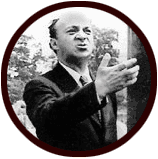 |
||
|
|
||||||||||||||||||||||||||||
|
Other Radio Broadcasts about the HolocaustDuring the Second World War the American mainstream press did not cover the mass slaughter of Europe’s Jews. As early as 1933 the columnist and commentator Walter Winchell condemned Nazi activities, only to be squelched by the notoriously anti-Semitic William Randolph Hearst. Reports on the roundup of civilians were occasionally published. And it was no secret that Jews were chief among those targeted. But Hitler’s plan to systematically exterminate all Jews under his power was simply never reported. To be sure, that failure can be attributed to the Third Reich’s success at maintaining a shroud of secrecy around its most abominable acts. And when rumors of mass executions, human slaughterhouses, and depraved scientific experiments did emerge, most people found them impossible to believe. But it is now clear that by early 1942 the United States government was aware of the ongoing industrial murder of Jews and suppressed that knowledge. The war was not going well for the Allies, and the last thing the U.S. Office of War Information wanted to foster was the perception that World War Two was being fought to save Jews. The American public at large first learned of the depths of the Holocaust on April 16, 1945, when, in the closing days of the war, Edward R. Murrow described the scene at the just-liberated concentration camp Buchenwald. But several earlier radio broadcasts discovered by Yiddish radio historian Henry Sapoznik provided stark imagery of the fate of Jews living across the Atlantic. One such broadcast is the May 7, 1941, "Cable from Lisbon," written by and featuring Edna Ferber and George S. Kaufman. Funded by the Joint Distribution Committee a Jewish refugee relief agency, the dramatization depicted the fate of Jews in a French town under German occupation. Another is a speech by Solomon Mikhoels, director of the Moscow Yiddish Art Theater and co-chair of the Jewish Anti-Fascist Committee, the Soviet agency that sponsored his 1943 lecture series in America. Mikhoels' graphic accounts of German atrocities -- including the famed but ultimately unproven allusions to soap made from victims' bodies -- had strong and lasting repercussions. After the war, Jewish relief agencies like the United Jewish Appeal sponsored English-language radio dramas including "My Town" and "Little Old Man," which documented the difficulties of Holocaust survivors in America and their new unwary hosts. In them, as in the July 6, 1947, Reunion broadcast, we can witness America's early attempts to come to terms with one of history's greatest tragedies.
|
|||||||||||||
| Copyright 2002 Sound Portraits Productions. All rights reserved. | |||

